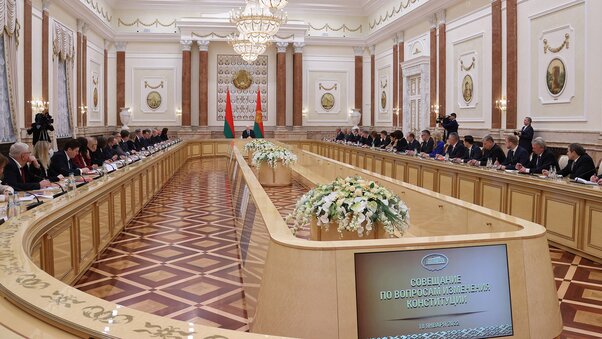Conference with NASB representatives
- 45
- 4
Belarusian science has something to be proud of, Belarusian President Aleksandr Lukashenko said at a meeting with representatives of the National Academy of Sciences of Belarus on 25 January.
According to the head of state, this meeting is special as the Palace of Independence has never hosted such a huge delegation of researchers before. Until now, the President met with scientists exclusively at the National Academy of Sciences.
“In the Year of Historical Memory, which coincided with an important date - the 100th anniversary of the Belarusian academic science - I would like to take stock of our work. We have something to remember. And most importantly, we have something to be proud of,” Aleksandr Lukashenko said.
The President noted that he had witnessed many of the scientists in attendance rising to academic heights. This was happening at a very difficult and decisive period when Belarus was establishing itself as an independent state, the President stressed.
“It was quite a challenge to preserve science in the country which economy was overloaded with debt and crippled by liberal reforms following the collapse of the Soviet Union. We rose to the challenge because we knew that science is the pillar of our statehood. People who devote their lives to the hardest work of a scientist are the golden pool of our nation no matter how clichéd it may sound. I am glad that you managed to make the most of your intellectual capacity and the resources offered to you by the government,” the head of state said.
The President noted that the history of Belarusian science started almost a third of a century ago. The country develops modern technology, runs innovative projects, sets up new production facilities. “It is your work that paved the way for Belarus' successes in such industries as space, information security, mechanical engineering, energy, precision farming and many others. We have made significant progress in the development of new medicines and methods to treat cancer, trauma, infectious diseases, heart diseases, the use of stem cells, and transplantation,” the head of state stressed.
Aleksandr Lukashenko presented state awards, academician and associate diplomas to scientists of the National Academy of Sciences of Belarus.
For the work “Innovative technologies in the exploration of potash deposits, development of high-technology and science-intensive production lines, manufacture of modern import-substituting highly efficient equipment for the potash industry” the award in science and technology has been presented to Director General of Belaruskali Ivan Golovaty, deputy chief engineer for mining – head of the mining department Andrei Petrovsky, deputy chief engineer for promising development – head of the promising development department Dmitry Barbikov, deputy director for production of the Soligorsk Institute of Resource Saving with a pilot production Aleksandr Konoplyanik, head of the chief design manager's department – deputy chief design manager Dmitry Dovnar, and head of the mining equipment department Vyacheslav Mikhalenya.
Thanks to the efforts of researchers, new potash mining technologies have been introduced in the production process, intellectual systems for the operation of technological processes have been used, the production of highly efficient import-substituting mining and chemical equipment has been launched. The use of new technologies helped increase the degree of potassium extraction by 20% (to 80%). As of today, this is the most efficient potash mine in the world (the degree of extraction in Russia, Germany and Canada does not exceed 40%). New extraction technologies reduced the production costs nine times in Belarus.
The application of cutting-edge mines ventilation technologies reduced energy consumption by 30%. A full cycle of producing modern import-substituting equipment for the potash industry has been launched. The total economic effect from this process made up Br993 million, over 700 jobs for highly qualified specialists were created.
For the cycle of works “New methods of diagnostics and treatment of cancer in adults and children” the state prize has been awarded to Director of the Aleksandrov National Cancer Center of Belarus Sergei Polyakov, Deputy Director for Science Sergei Krasny and Deputy Director for Surgery Viktor Kokhnyuk, head of the thoracic cancer pathology lab Viktor Malkevich.
The authors have developed and introduced 80 methods of cancer treatment, registered 58 patents. A system of high-technology cancer treatment has been created. Thanks to the application of new methods the quality cancer treatment and diagnostics has improved, the mortality rate has decreased.
The five-year survival rate has increased 1.5-3 times. Thanks to the application of new technologies in 2000-2017, Belarusian doctors saved over 12,800 lives.
Apart from that, an efficient oncohematological service for children has been created, cutting-edge cancer diagnostics and treatment technologies have been introduced. The survival of children under 17 years old has increased from 54.7% in 1995 to 75% in 2017. The survival rate of children with certain types of cancer is above 90%. This is comparable with the results of the world's leading centers. Belarus has one of the best results in the world in the treatment of acute lymphoblastic leukemia.
The award in literature, art and architecture has been presented to Dean of the Sculpture Department of the Belarusian State Academy of Arts Konstantin Kostyuchenko for the design of the monument “The Gates of Memory” in the Trostenets Memorial Complex. The project makes a big contribution to the formation of the pan-European culture of memory, to the promotion of understanding between nations. The bronze sculpture does not have analogues in the modern Belarusian art and is an outstanding piece of art.
Academician and associate diplomas have been also presented to the representatives of the National Academy of Sciences of Belarus working in various fields of research, including the humanitarian field, physics, chemistry, microbiology.


